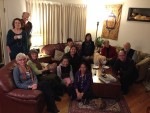Members of the Momo Minyan with Lhamo Dolma, Phurba Jompa and Lobsang Dolma. (photo from David Berson)
After a meeting between the Dalai Lama and Prime Minister Stephen Harper in 2007, and with the later support of then citizenship and immigration minister Jason Kenney, a resettlement plan for 1,000 displaced Tibetans in Canada was announced.
Seven years later, in April 2014, Or Shalom congregant Vicky Robinson gave a presentation on sponsoring Tibetan migrants. The presentation resulted in a number of congregants coming together to establish the Momo Minyan. The group was named by David Berson to represent a mixture of Jewish and Buddhist culture to help facilitate the move and integration into Canadian Society of two Tibetan refugees. (For a March 2014 story about the background of the group, click here.)
“I feel like I won the birthright lottery living here in Vancouver,” Berson said. “We started discussing the responsibility that this involves, because the Canadian government had given a go ahead for 1,000 people to come from Arunachal Pradesh, which is on the border with Tibet.”
Many of the refugees have been without status for more than 50 years, after India stopped granting Tibetans citizenship in 1959. As described by Berson, the Tibetans who are being sponsored lack many of the rights associated with citizenship and have been left with few choices.
“Tibetans that are on the border have limited rights, limited education [and] health care, but can work. We were moved by their story and their whole notion of the immigrant experience…. It is what the Jewish people have gone through.”
A trip was organized by the Minyan and its partners to visit the Tibetan communities in the fall of 2014. The trip involved assessing the conditions in remote villages in Arunachal Pradesh while trekking in the Himalayan mountains. On the journey, the participants traveled through areas considered sacred to Buddhists, where religious texts have been buried in Pemako, an area with 108 lakes.
Berson attended on behalf of the Momo Minyan, which joined with members of North Shore Search and Rescue. Many members of Or Shalom fundraised for the trip through donations to the Tibetan Cultural Society of British Columbia.
The main destination was Tuting, a city where 200 of the migrants live. When Berson arrived there, he was shocked at what he saw. “In Tuting, there is no internet, so any communication has to be done via snail mail. It can sometimes take a month or two … the way of life for Tibetans in this city is involved in some commerce and some farming, but they are still not looked at as full citizens.”
The trip also was an opportunity to promote Canada as the refugees’ new home. “We went to visit the resettlement office and presented them with a big Canadian flag, and we gave out a lot of Canadian pins along the way,” he recalled.
Since that trip, two Tibetan women who are being sponsored by the Momo Minyan have arrived in Vancouver. In September, Vancouver welcomed 36-year-old Lobsang Dolma and, in December, 28-year-old Lhamo Dolma arrived with her sister Phurba Jompa (who was sponsored by another group).
Once in Vancouver, members of the Momo Minyan assisted the new migrants in obtaining medical insurance, signing up for a social insurance number, assisting with English tests, helping to find work and housing for a one-year period.
Lobsang’s first job was at Or Shalom Synagogue, where she worked in the kitchen and as a custodian for pay. She has since worked as a dishwasher elsewhere four days a week and continues to take evening English classes.
While Lhamo continues to attend English classes alongside her sister four nights a week, her road has been less smooth and she has had less luck with employment.
According to Berson, members of the Momo Minyan are committed to introducing the migrants to people in their new communities. “It is hard for them; they left their families behind, want to be with their families. It is a sense of urgency many of us here do not need to experience because we do not need to worry about the basics of life.”
There are other challenges for members as well, Berson described. “It is clothing, it is language, it is how to get from one place to another, we take a lot of things for granted … and language is so important. And, at the same time, these women want to start working because they will need to support themselves and to make a living, a real tradeoff between learning the language and wanting to earn.”
Financial challenges are deepened, as the two women want to make money to support themselves, but also want to save money to send back home to help their families.
Cultural norms also affect the migrants’ experience in Canada. An example is in acquiring doctor’s services, which can lead to issues with communication, and access to health services. In India, services are far away and there is not an expectation that there will be an interaction between patient and doctor. “There are different expectations [here],” Berson explained. “Canadians interact more with their doctors than in India.”
The minyan and the Tibetan Cultural Society of B.C. are committed to bringing as many Tibetans from Arunachal Pradesh as are on the list to resettle in Canada and welcome support for the project. Residential accommodation and employment opportunities are areas where the minyan has asked for assistance. More opportunities to sponsor future migrants may occur, as well.
Gil Lavie is a freelance correspondent, with articles published in the Jerusalem Post, Shalom Toronto and Tazpit News Agency. He has a master’s of global affairs from the Munk School of Global Affairs at the University of Toronto.

